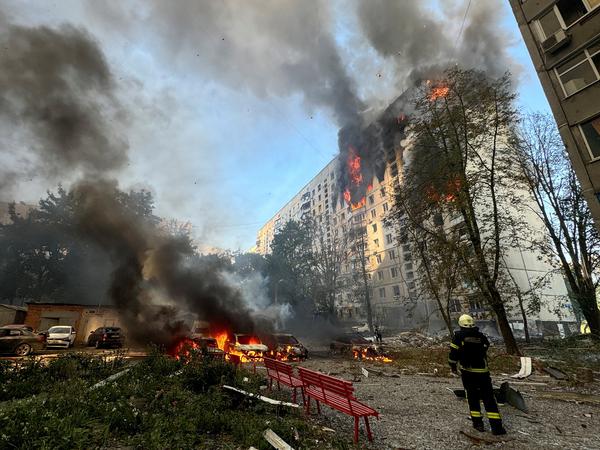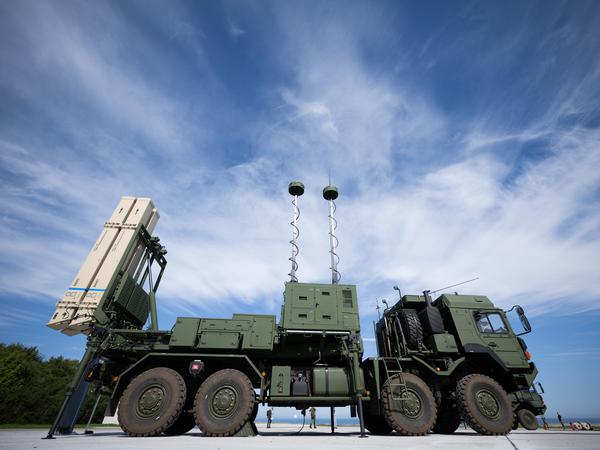Mr. Heinemann, there has been a lot of talk recently about interest income from frozen Russian assets. This is supposedly intended to compensate for possible cuts in German aid to Ukraine. What kind of frozen money are we talking about?
First of all, it is important to stress that the money whose interest we are talking about is not the private assets of any oligarchs. Instead, it is money from the Russian Central Bank, i.e. Russian state assets.
EU and G7 countries froze this money due to economic sanctions after Russia began its full-scale invasion of Ukraine.
What amounts are we talking about?
In total, around 300 billion US dollars were blocked in Western countries. More than 200 billion of this is in the European currency area.
To person
Patrick Heinemann is a specialist lawyer for administrative law and a member of the German Society for Military Law and International Humanitarian Law
Why is there so much money there?
The fact that the Russian central bank has deposited so much money abroad is quite normal. All large state banks have reserves of foreign currency. And it is of course a good idea to invest these foreign currency reserves in stable currencies such as the euro and dollar.
But Moscow can no longer access it. The lion’s share of the 200 billion dollars frozen in Europe is deposited with a so-called clearing company called Euroclear in Belgium. And the income that this wealth generates is also deposited there.
These are precisely the proceeds at stake. The G7 countries agreed a few months ago to confiscate them in order to provide Ukraine with 50 billion dollars next year.
Yes, but it is not yet clear what exactly is going to happen. There is always talk of Kyiv receiving these 50 billion, and that is correct. But from the Ukrainian side we hear that they have not yet received any concrete announcements – and therefore no planning certainty.
 Since February 24, 2022, Russia has been waging a large-scale war of aggression against Ukraine. Western states have therefore imposed economic sanctions – and, among other things, frozen Russian central bank assets.
Since February 24, 2022, Russia has been waging a large-scale war of aggression against Ukraine. Western states have therefore imposed economic sanctions – and, among other things, frozen Russian central bank assets.
What’s the problem?
There is no agreement yet on how the money should reach Ukraine.
So: Should these 50 billion dollars be granted to Ukraine directly as a loan? Or should G7 and EU countries take out a loan and then pay it off with the interest? Or should they take it out and just use the interest to secure it? These crucial details are still completely up in the air.
Ukraine’s claim under international law is the basis on which the confiscation of this money was discussed in the first place. But national aid is something completely different.
Patrick Heinemann, Jurist
Why is it so difficult to agree on a procedure?
One obstacle is the fundamentally different attitudes of the individual countries: The USA, Canada, but also the Baltic states and Poland have long been pushing for frozen funds to be used for Ukraine. Germany and France in particular, on the other hand, have been more reluctant to do so.
Background to the debate
In mid-August, a report in the “Frankfurter Allgemeine Sonntagszeitung” caused a stir: According to it, Finance Minister Christian Lindner (FDP) in a letter to Defence Minister Boris Pistorius (SPD) and Foreign Minister Annalena Baerbock (Greens), that “new measures” in aid to Ukraine may only be undertaken if “financing is secured” in the budget plans. Ukraine supporters are very concerned because the federal budget for 2025 only provides four billion euros in military aid for the attacked country – a significant drop compared to the almost 7.5 billion euros this year.
A little later, the Finance Ministry declared that it was still willing to talk. However, specific needs had to be reported, it said. And: In principle, the Federal Government is counting on Ukraine could be supported more in the future with the help of interest from frozen Russian state assets.
In addition, you need planning security if you want to use these earnings now. So it must be clear that Russian assets will remain frozen in the long term.
In the European Union, however, the sanctions against Russia currently have to be extended every six months – which makes the country somewhat dependent on opponents of sanctions such as Hungarian Prime Minister Viktor Orbán.
That is why there is now discussion about whether Russian assets can be frozen permanently or at least for a longer period of time. But here too, everything is still completely unclear.
 In the past, Germany has supported Ukraine with, among other things, Iris-T air defense systems.
In the past, Germany has supported Ukraine with, among other things, Iris-T air defense systems.
Assuming that these problems are solved and the interest money benefits Ukraine in a timely manner, could it then offset possible cuts in German military aid?
Most considerations regarding the disposal of the Russian central bank’s assets are based on the fact that the Russian Federation already owes reparations to Ukraine – on the basis of the law of state responsibility, which is a type of international law on compensation for damages.
I think it is justifiable that the Russian central bank’s assets should be confiscated and given to Ukraine in order to pay off Russia’s reparations debts.
The point is: Ukraine’s claim under international law is the basis on which the confiscation of this money was discussed in the first place. National aid for Ukraine is something completely different.
More on the topic at Tagesspiegel Plus
German government reorganizes aid to Ukraine Is Kiev now running out of money? Military aid for Ukraine The G7 and the delicate 50 billion dollar plan for Kiev “Ukraine is putting everything on the line” What is happening in Kursk right now, Colonel Reisner?
So a legal grey area?
At least we have to be clear about what we are talking about. Moreover, the whole idea of using interest rates to plug holes in national military aid is nonsense, even from an economic perspective.
Ukraine needs military aid for its army. It needs reparations to compensate for war damage. If you take the money that was intended to repair the damage and put it into the military, the damage will still be there.
